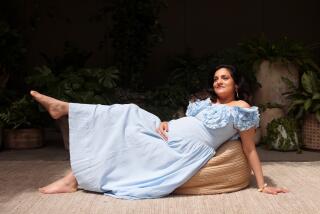Sexy TV host’s popularity underscores Pakistan’s contradictions
- Share via
Reporting from Karachi, Pakistan — Raunchy. An inspiration. A sex kitten. Pakistan’s Paris Hilton.
TV host Mathira Mohammad has been called all that and more. Love her or hate her, she’s making waves, as critics in Pakistan accuse her of immorality and supporters laud her willingness to tackle taboo subjects such as sexuality, love and HIV/AIDS.
“A lot of people judge me by what I wear, say I’m not a good woman,” she said, loping through the lobby of a five-star hotel in Karachi wearing leopard-skin shoes and a sleeveless Ali Baba outfit, as jaws dropped and necks swiveled. “The clothes aren’t anything.”
Other celebrities show more cleavage and wear shorter skirts, but don’t catch on, said Mathira, as she’s universally known. “Whenever I go, the show starts. When I leave, it ends.”
Her popularity — fueled by a quick wit, sex appeal and shock factor — underscores the diversity and contradictions of a country often seen abroad as little more than a land of suicide bombers, Islamic fundamentalists and national disasters.
“Our society is supposed to be pious, yet you have girls like this doing raunchy numbers and they’re very popular,” said Mazhar Zaidi, a documentary filmmaker. “Pakistan’s a complicated society, at one level very orthodox, at another it’s just a veneer.”
Mathira, 19, started with a yoga cable TV program a few years ago before hosting “Love Indicator,” a late-night advice show. Her provocative attire and thoughts on sex, relationships and in-laws soon boosted ratings.
But her big break came when a male caller made lewd suggestions.
“That’s sad,” she fired back live, without a moment’s hesitation. “Pakistan, you are so frustrated. Go to your wife.... If you don’t have a wife, find a wife, or do something to get rid of this frustration. Live TV is not a place to release your frustration.”
The video went viral.
Her humor, including an ability to laugh at herself, has also caught people’s attention.
“I don’t believe ‘all men are dogs,’” she said, before urging wives to leash their canines. “A dog is a man’s best friend and can also bite. It depends on how you treat it.”
At a restaurant in downtown Karachi, Afia Firaz, 25, sat eating a sandwich and French fries. “The show is very vulgar,” she said. “It’s a bad trend for Pakistani society.”
Two tables away, outsourcing employee Zia Ahmed, 28, disagreed. “She’s the future of our country. It’s pushing limits, raising issues generally not spoken about in the media. We’re progressing because of people like her.”
Mathira plays dumb, fueled by her signature on-air baby talk. But off-camera, in a wide-ranging interview, she’s professional and well-informed, decrying Pakistan’s growing fundamentalism, huge military budgets and dismal education system.
“She’s smart, knows what she’s doing, is a good businesswoman,” said Andleeb Rana, editor of Xpoze magazine, which featured her on its cover. “Dumb? It’s part of the brand.”
As Mathira sees it, Pakistan is a small, backbiting society that smiles to her face but flings knives in her back. A Muslim, and hardly a feminist, she decries the hypocrisy of Muslims drinking in private even as they publicly denounce alcohol as sinful. She says her relationship with her God is personal.
She acknowledges the threat of being attacked by fundamentalists but says she’s careful and has protectors. Ordinary life, she says, continues in Pakistan despite a view that it’s all terrorism.
“There are criminals everywhere,” she said, “even Beverly Hills.”
Her biggest fans are, not surprisingly, men. But women watch in droves, whether in shocked fascination or to learn something. Her show isn’t X-rated, and she talks to anyone who calls.
“You need to educate people about condoms, rape, how to avoid being molested,” she said. “But people here think I’m crazy. It’s closed-mindedness that creates crime and terrorists.”
The younger of two daughters, Mathira was born in Zimbabwe to a Pakistani mother and an African father. When she was 13, the family moved to Pakistan, somewhat ironically, to flee political instability. She describes a difficult transition — not speaking Urdu, berated by peers — that ultimately toughened her.
“I was bullied,” she said. “It’s hunt or be hunted. I decided to be the hunter.”
She’s clearly ambitious, and unapologetic about using sex appeal to further her career.
Some say the harsh criticism she gets for clothing and actions that would seem normal elsewhere embodies the contradictions faced by Pakistani professional women.
“If you have a degree and are successful, it’s always, ‘Oh, she’s slept her way up,’” said Rana, the editor. “In Islam, women who go out of the house are suspect. As a successful woman, you have to stop listening, and Mathira is good at tuning it out.”
Mathira’s open discussion of sexuality has been condemned by religious conservatives, including the hard-line Jamaat-i-Islami organization.
That’s to be expected, some say.
“For a large part of a Muslim conservative society, female sex is very frightening,” said Sami Shah, a stand-up comedian who was co-host of an awards ceremony with Mathira. “The idea that women enjoy sex too, it’s too much to deal with.”
Recently Mathira switched TV networks in search of a bigger stage. Ratings for her new show haven’t matched those for “Love Indicator.” She’s considering new opportunities, and doesn’t rule out India’s Bollywood one day.
“Life is like a car,” she said. “There’s not much view back and a big windscreen forward.”
More to Read
The biggest entertainment stories
Get our big stories about Hollywood, film, television, music, arts, culture and more right in your inbox as soon as they publish.
You may occasionally receive promotional content from the Los Angeles Times.










